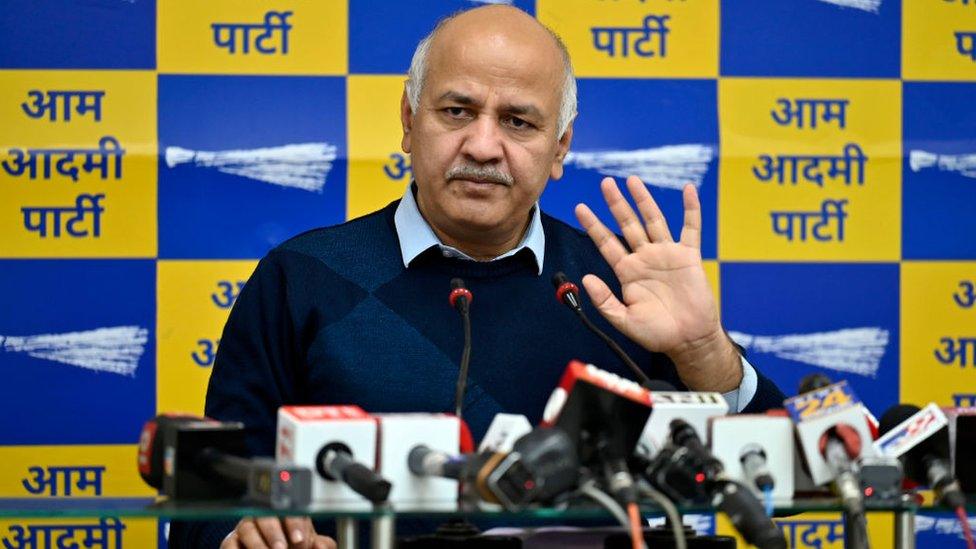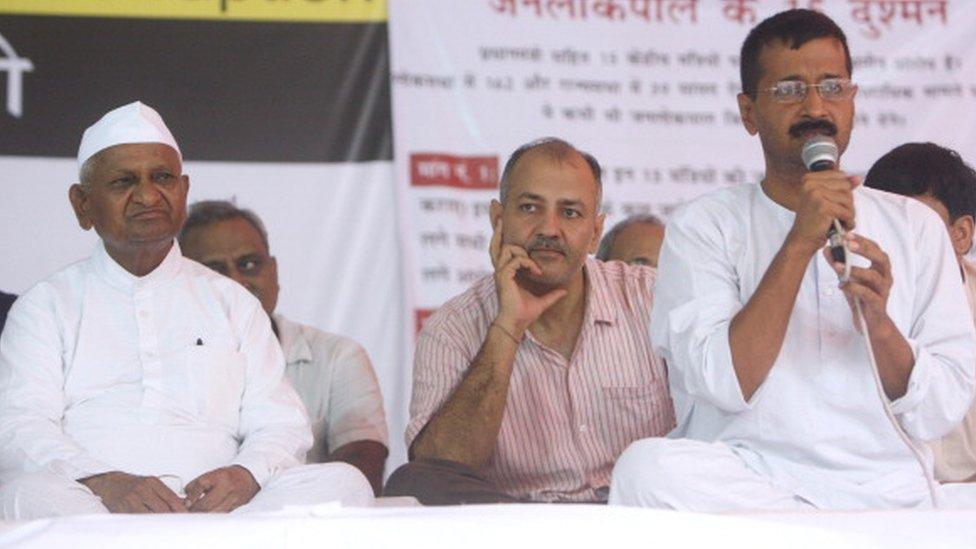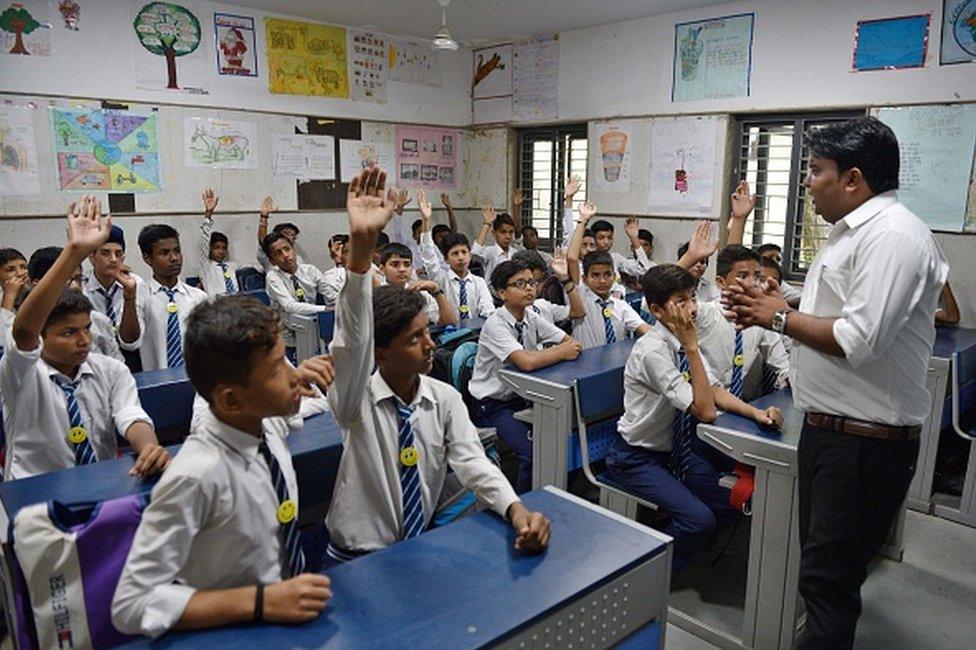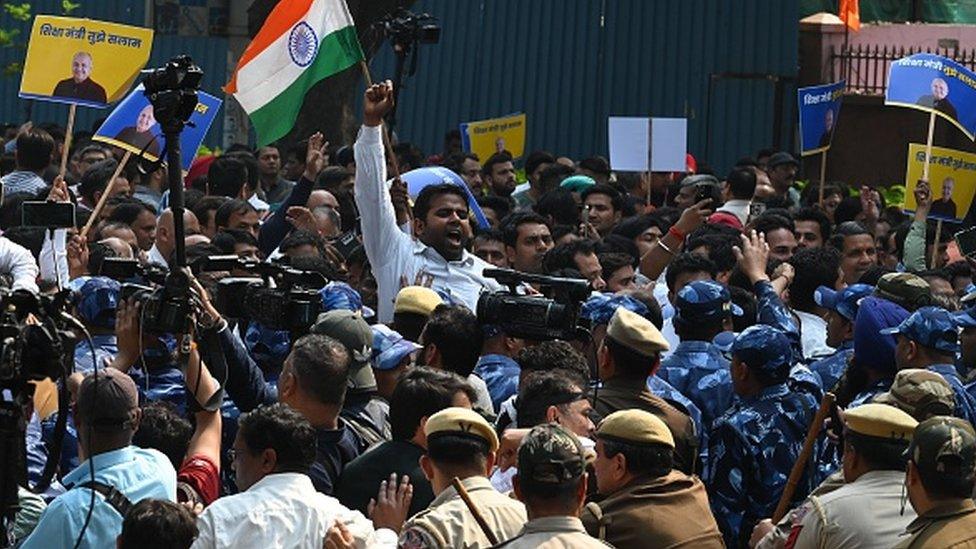Manish Sisodia: India anti-corruption crusader fighting to clear his name
- Published

Manish Sisodia is best known for his work as Delhi's education minister
Manish Sisodia, Delhi's former deputy chief minister who's now under arrest on corruption charges, resigned on Tuesday night from all his ministerial posts. In his resignation letter, he said he would stay away until the charges against him were proven false.
One of India's most high-profile politicians, Mr Sisodia only entered politics a decade ago but is second in command of the Aam Aadmi Party (AAP), which governs the Indian capital and is vying to become a key opposition force ahead of next year's general elections.
He has played a major role in increasing the party's footprint not just in Delhi but across other states, most recently in neighbouring Punjab where it won a resounding mandate last year.
So it's no surprise that Mr Sisodia's arrest on Sunday over alleged irregularities in a liquor sales policy in Delhi set off a political storm.
Mr Sisodia's critics have cited the arrest to question his credibility - corruption is a sensitive issue for the AAP, as the party emerged from a major movement against it.
But Mr Sisodia, 51, and the AAP say he's done nothing wrong and are challenging his arrest by the Central Bureau of Investigation (CBI) in the Supreme Court.
They allege that India's governing Bharatiya Janata Party (BJP) is targeting its opponents, which the BJP denies.
Mr Sisodia, a former journalist, is often seen as a trusted lieutenant to Delhi's Chief Minister Arvind Kejriwal, who is AAP's most popular leader.
But he is best known for his work as Delhi's education minister - and credited with overhauling a school system which had long been hobbled by poor infrastructure, mismanagement and lack of resources.
Early years
Born in Hapur, a small city in the northern state of Uttar Pradesh, Mr Sisodia studied Hindi literature before doing a diploma in journalism.
For nearly two decades, he worked as reporter and news anchor with organisations such as Zee News and the state-run All India Radio.
In the early 2000s, Mr Sisodia entered political activism after he met Mr Kejriwal, who was a charismatic bureaucrat at the time.
Together, they participated in an agitation for a nation-wide Right to Information (RTI) Act, a landmark law that allowed people to access information held by the government.
Later, they gained national attention by joining a massive anti-corruption movement - led by activist Anna Hazare - which swept the country in 2011 and eventually triggered the ouster of the Congress-led federal government in 2014.

Mr Kejriwal (right) and Mr Sisodia (centre) participated in a massive anti-corruption movement in 2011
Entry into politics
In 2012, Mr Sisodia entered active politics, becoming a founding member of the AAP.
The party was made up of activists, academics and journalists - mostly liberals and leftists - who positioned themselves as an alternative to the dynastic politics, corruption and nepotism that plagued national politics in India. It made a spectacular debut in 2013, winning the assembly elections in Delhi.
Sisodia became a cabinet minister in charge of a host of portfolios, including education, public works and urban development. He would later go on to become the deputy chief minister and the capital's finance minister.
Under Mr Sisodia's leadership, the AAP government invested millions of dollars in building new classrooms and providing other amenities, including clean drinking water and bathrooms, to change the gloomy image of state-run schools in the city. The Delhi government currently runs over 1,000 such schools where - like other Indian states - education is free for more than 1.5 million students.
The initiative received high praise - even global recognition - and shot Sisodia into the limelight. The minister was often seen making surprise visits to schools and questioning officials about their dilapidated state.

Mr Sisodia is credited with reforming Delhi's public school system
Experts say the project, along with AAP's larger push into bettering services such as health and education, also helped the party further its political footprint.
Is he a controversial politician?
Not really. But AAP's welfare model of governance has generally been a thorny issue for the BJP, Delhi's main opposition party. The BJP routinely accuses Mr Kejriwal and others of deceiving voters by offering false promises and freebies.
Though it's a relatively new party, the AAP has fast become a formidable opponent which is trying to challenge the BJP in several states. In December, it made inroads into Prime Minister Narendra Modi's home state Gujarat by winning five seats in the state election.
Last year, the BJP criticised a New York Times report, external which praised the Delhi government's work in revamping schools.
The party called the report "paid news", but both the AAP and the newspaper denied this - the NYT said its report was based on "impartial, on-the-ground reporting".
The NYT report came while Mr Sisodia's house was being raided by the CBI, which reports to the federal government, in connection with the case he has now been arrested under - alleged irregularities in a liquor sales policy.
Under the policy, enacted by the Delhi government in 2021, private vendors were allowed to sell all liquor in the city, a major shift from earlier rules that permitted both public and private vendors to sell alcohol.
The AAP said the scheme would help curb black market sales, increase revenues and ensure that liquor licences were distributed equally across the city.
But the policy had to be withdrawn in July after Delhi Lieutenant Governor Vinai Kumar Saxena accused Mr Sisodia, external of misusing rules "with the sole aim of benefitting private liquor barons" and "individuals at the highest echelons of the government". The AAP and Mr Sisodia denied all the allegations.
Authorities started an investigation against Mr Sisodia in August. In a statement on Tuesday, the CBI alleged that Mr Sisodia had given investigators "evasive replies" when they questioned him.

AAP workers have held protests against Mr Sisodia's arrest across India
The AAP has said that Mr Sisodia is innocent and that his arrest was the result of "dirty politics".
However BJP MP Manoj Tiwari dismissed this, saying the CBI was impartial in its investigation.
"The law is doing its job," he said.
What will happen next?
Hard to say, but investigations are under way and the AAP is expected to continue protesting while Mr Sisodia is in CBI custody.
Some opposition leaders, meanwhile, have criticised Mr Sisodia's arrest and accused the BJP of harbouring a political vendetta against critics.
Last year, Delhi's health minister Satyendra Jain was also arrested by another federal agency in connection with a money laundering case - he has denied the allegations, and is still in jail.
Apart from Both Mr Sisodia and Mr Jain resigned from the Delhi cabinet on Tuesday evening. While they are away, the AAP is likely to find it challenging to make up for their absence.
BBC News India is now on YouTube. Click here, external to subscribe and watch our documentaries, explainers and features.

Read more India stories from the BBC:

- Published31 March 2015
- Published5 February 2020